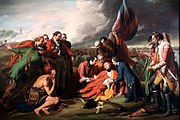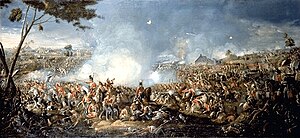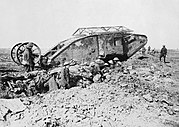The British Army came into being with the merger of the
Scottish Army and the
English Army, following the unification of the two countries' parliaments and the creation of the
United Kingdom of Great Britain in 1707. The new British Army incorporated existing English and Scottish regiments, and was controlled from
London.


The Death of
General Wolfe during the
Battle of Quebec.
From roughly 1763 the United Kingdom has been one of the leading military and
economic powers of the world. The
British Empire expanded in this time to include
colonies,
protectorates, and
Dominions throughout the
Americas,
Africa,
Asia and
Australasia. Although the
Royal Navy is widely regarded as having been vital for the rise of the
British Empire, and British dominance of the world, the British Army played important roles in colonisation. Typical tasks for the Army included
garrisoning the colonies, capturing strategically important territories and participating in actions to pacify colonial borders, provide support to allied governments, suppress Britain's rivals, and protect against foreign powers and hostile natives. British troops also helped capture strategically important territories for the British, allowing the British Empire to expand throughout the globe. The Army also involved itself in numerous wars meant to pacify the borders, or to prop-up friendly governments, and thereby keep other, competitive, empires away from the British Empire's borders. Among these actions were the
Seven Years' War, the
American Revolutionary War, the
Napoleonic Wars, the
First and
Second Opium Wars, the
Boxer Rebellion, the
New Zealand land wars, the
Indian Rebellion of 1857, the
First and
Second Boer Wars, the
Fenian raids, the
Irish War of Independence, its serial interventions into
Afghanistan (which were meant to maintain a friendly buffer state between British India and the
Russian Empire), and the
Crimean War (to keep the Russian Empire at a safe distance by coming to Turkey's aid).

 Battle of Waterloo
Battle of Waterloo was one of the British Army's greatest victories.
As had its predecessor, the
English Army, the British Army fought
Spain,
France, and the
Netherlands for supremacy in
North America and the
West Indies. With native and provincial assistance, the Army conquered
New France in the
Seven Years' War and subsequently suppressed a
Native American uprising in
Pontiac's War. The British Army suffered defeat in the
American War of Independence, losing the
Thirteen Colonies but holding on to
Canada.
The British army was heavily involved in the
Napoleonic Wars in which the army served in
Spain, across
Europe, and in
North Africa. The war between the British and
First French Empires stretched around the world. The British Army finally came to defeat
Napoleon at one of Britain's greatest military victories at the battle of
Waterloo.


An artist's interpretation of
The Battle of Rorke's Drift in which 11 VCs were awarded to British troops. The battle is remarkable in that a hundred well-armed British soldiers managed to defend the small, walled compound of a farmstead and hold off six[
citation needed] thousand native warriors and their spears long enough for them to give up and leave them alone.
Under
Oliver Cromwell, the English Army had been active in the conquest, and the settlement, of
Ireland since the 1650s. The Cromwellian campaign was characterised by its uncompromising treatment of the Irish towns (most notably
Drogheda) that had supported the Royalists during the English Civil War. It (and subsequently, the British Army) have been almost continuously involved in Ireland ever since, primarily in suppressing numerous Irish revolts and campaigns for
self-determination. It was faced with the prospect of battling Anglo-Irish and
Ulster Scots settlers in Ireland, who alongside their Irish countrymen had raised their own volunteer army and threatened to emulate the American colonists if their conditions (primarily concerning home rule and freedom of trade) were not met. The British Army found itself fighting Irish rebels, both Protestant and Catholic, primarily in Ulster and Leinster (
Wolfe Tone's United Irishmen) in the
1798 rebellion.
In addition to battling the armies of other European Empires' (and of its former colonies, the
United States, in the
American War of 1812,) in the battle for global supremacy, the British Army fought the
Chinese in the
First and
Second Opium Wars, and the
Boxer Rebellion;
Māori tribes in the first of the
New Zealand Wars;
Indian princely forces and
British East India Company mutineers in the
Indian Mutiny; the Boers in the
First and
Second Boer Wars; Irish
Fenians in Canada during the
Fenian raids; and
Irish separatists in the
Anglo-Irish War.
Following William and Mary's accession to the throne,
England involved itself in the
War of the Grand Alliance primarily to prevent a French invasion restoring Mary's father,
James II. Following the 1707
union of England and Scotland, and then the 1801 creation of the
United Kingdom of Great Britain and Ireland, British foreign policy, on the continent, was to contain expansion by its competitor powers such as
France and
Spain. The territorial ambitions of the French led to the
War of the Spanish Succession and the
Napoleonic Wars. Russian activity led to the
Crimean War.
The vastly increasing demands of imperial expansion, and the inadequacies and inefficiencies of the underfunded, post-Napoleonic Wars British Army, and of the
Militia,
Yeomanry, and
Volunteer Force, led to the
Cardwell and
Childers Reforms of the late 19th century, which gave the British Army its modern shape, and redefined its
regimental system. The
Haldane Reforms of 1907, formally created the
Territorial Force as the Army's volunteer reserve component.


British
Mark One Tank during
World War I. Note the guidance wheels behind the main body which were later scrapped as they were unnecessary. Armoured vehicles of this time still required much infantry and artillery support and still do to a lesser extent even in today's military.

 Battle of El Alamein
Battle of El Alamein.
Great Britain's dominance of the world had been challenged by numerous other powers, notably the
German Empire. The UK was allied with France (by the
Entente Cordiale) and Russia, and when the
First World War broke out in 1914, the British Army sent the
British Expeditionary Force to France and Belgium to prevent Germany from occupying these countries. The War would be the most devastating in British military history, with near 800,000 men killed and over 2 million wounded. In the early part of the war, the professional force of the BEF was decimated and, by turns, a volunteer (and then conscripted) force replaced it. Major battles included the
Battle of the Somme. Advances in technology saw advent of the
tank, with the creation of the
Royal Tank Regiment, and advances in
aircraft design, with the creation of the
Royal Flying Corps, which were to be decisive in future battles.
Trench warfare dominated strategy on the
Western Front, and the use of chemical and poison gases added to the devastation.
In 1939, the
Second World War broke out with the German invasion of
Poland. British assurances to the Polish led the British Empire to declare war on Germany. Again an
Expeditionary Force was sent to France, only to be hastily evacuated as the German forces swept through the Low Countries and across France in 1940. Only the
Dunkirk evacuations saved the entire Expeditionary Force from capture. Later, however, the British would have spectacular success defeating the Italians and Germans at the
Battle of El Alamein in
North Africa, and in the
D-Day invasions of Normandy with the help of American, Canadian, Australian and New Zealand forces. Contrary to popular (Hollywood influenced) belief, over half of Allied soldiers on D-day were British. In the Far East, the British Army battled the
Japanese in
Burma. World War II saw the British army develop its
Commando units including the
Parachute Regiment and
Special Air Service. During the war the British army was one of the major fighting forces on the side of the allies.
After the end of World War II, the British Army was significantly reduced in size, although
National Service continued until 1960. This period also saw the process of
Decolonisation commence with the end of the
British Raj, and the independence of other colonies in Africa and Asia. Accordingly the strength of the British military was further reduced, in recognition of Britain's reduced role in world affairs, outlined in the
1957 Defence White Paper, although major conflicts had been recently fought in form of the
Korean War in 1950 and
Suez Crisis in 1956. A large deployment of
British troops also remained in Germany, facing the threat of
Soviet invasion. The
Cold War saw significant technological advances in warfare, and the Army saw more technologically advanced weapons systems come into service.


British soldiers guard
Argentine prisoners of war during the
Falklands War.
Despite the decline of the
British Empire, the Army was still deployed around the world, fighting colonial wars in
Aden,
Cyprus,
Kenya and
Malaya. In 1982 the British Army, alongside the
Royal Marines, helped to recapture the
Falkland Islands during the
Falklands War against
Argentina.
In the three decades following 1969, the Army was heavily deployed in
Northern Ireland, to support the
Royal Ulster Constabulary (later the
Police Service of Northern Ireland) in their conflict with loyalist and republican paramilitary groups, called
Operation Banner. The locally-recruited
Ulster Defence Regiment was formed, later becoming the
Royal Irish Regiment in 1992. Over 700 soldiers were killed during the
Troubles. Following the
IRA ceasefires between 1994 and 1996 and since 1997, demilitarisation has taken place as part of the peace process, much reducing the military presence in the area. On 25 June 2007, the Second Battalion Princess of Wales's Royal Regiment vacated the Army complex at Bessbrook Mill in Armagh. This is part of the 'normalisation' programme in Northern Ireland in response to the IRA's declared end to its activities.